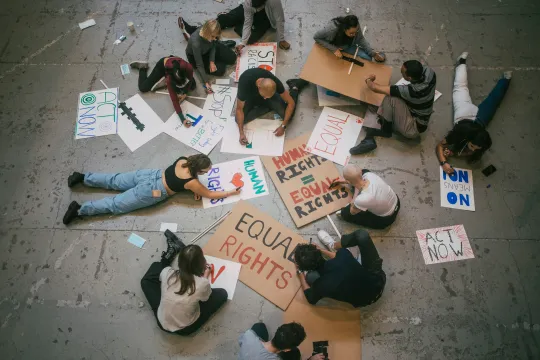Being ‘woke’ used to simply mean that you were aware of discrimination, prejudice and social injustices. However, it’s since evolved into a catch-all term for all ‘progressive’ political thinking, and is now basically used as an insult by more conservative or centrist types, or even left-leaning people who think wokeness encapsulates the extreme side of leftism.
Well, whether you believes it’s good to be woke or not, a new study suggests that wokeness is linked with higher levels of unhappiness, anxiety and depression.
Research from Finland suggests that stronger alignment with pro-social justice stances correlates strongly with increased instances of both anxiety and depression. Author of the research, Oskari Lahtinen, who is a senior researcher at the INVEST Research Flagship Centre at the University of Turku, started with a sample of 851 people, then scaled it up to 5,000 to get a more representative view.
Participants were asked a series of questions to determine their attitudes towards various social justice issues and views on ‘systemic oppression’. This included charting their reactions to the following statements:
- ‘If white people have on average a higher level of income than black people, it is because of racism’
- ‘University reading lists should include fewer white or European authors’
- ‘Microaggressions should be challenged often and actively’
- ‘Trans women who compete with women in sports are not helping women’s rights’
- ‘We don’t need to talk more about the colour of people’s skin’
- ‘A white person cannot understand how a black person feels equally well as another black person’
- ‘A member of a privileged group can adopt features or cultural elements of a less privileged group’
The study then asked people about their mental health. Sure enough, the results found a strong link between an increase in reports of anxiety and depression and a greater level of agreement with critical social justice beliefs or ‘wokeness’.
Lahtinen said: ‘I had been paying attention to a development in American universities, where a new discourse on social justice became prevalent in the 2010s. While critical social justice (or ‘intersectional’ or ‘woke’) discourse draws mainly from dynamics within American society, it has now surfaced in other Western countries as well.’

Obviously this research only technically indicates a link between wokeness and negative mental health in Finland, but I guess it’s hardly shocking that the capacity for empathy in a cruel and unjust world would cause heightened levels of anxiety, depression and unhappiness, especially for young people who become obsessed with these issues and essentially base their entire personalities around them. Doubly so if you’re the type to be offended by everything and see injustice/victiminsation/microaggressions everywhere you look.
Then again, sometimes all you have to do is read the news to get unhappy/depressed/anxious, with all the awful things happening around the world. You don’t necessarily have to be ‘woke’ or involved in social justice at all. I guess it’s a reminder that we should all focus on our own mental health first and foremost, before even attempting to tackle or educate others on all the problems in the world.
For the ‘woke’ rebrand of London Overground trains that has sparked fury from commuters, click HERE. I guess even the anti-woke are susceptible to unhappiness?















